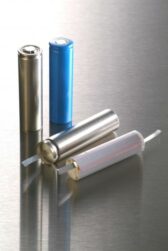UK-based battery materials firm Nexeon has been awarded GBP7million ($9.5m) to support research into silicon-based materials to increase the safety and range of batteries for electric vehicles.
Nexeon said the support from the government’s Innovate UK agency will support its work with partners on a project called ‘SUNRISE’ to develop improved materials, based on silicon as a replacement for carbon in the lithium-ion battery anode and optimising cell designs for automotive application.
The project is supported by partners British chemicals firm Synthomer and University College London and aims to increase the range of EVs to 400 miles and more between battery charging, Nexeon said.
Nexeon said the research addresses the issues of silicon expansion and binder systems— and allows more silicon to be used to increase the energy density in cells.
According to Nexeon, the innovative silicon anode material with a polymer binder represents a ‘drop-in’ replacement for current graphite anode systems. By developing the project, lower cost and better performance batteries would help EVs to achieve mass adoption, the company said.
Nexeon CEO, Dr Scott Brown said: “Silicon anodes are now well established on the technology roadmaps of major automotive OEMs and cell makers, and Nexeon has received support from UK and global OEMs, several of whom will be involved in this project as it develops.”
Nexeon is leading the silicon material development and scale-up stages of SUNRISE and will team up with University College London for material characterisation and cell performance.
Synthomer will be in charge of the development of a “next generation polymer binder”.
Innovate UK will fund the majority of the total GBP10m cost of the project as part of the Faraday Battery Challenge, which is to support innovation and the “scale-up of battery technology” as part of the government’s wider industrial strategy in the run-up to Brexit.












